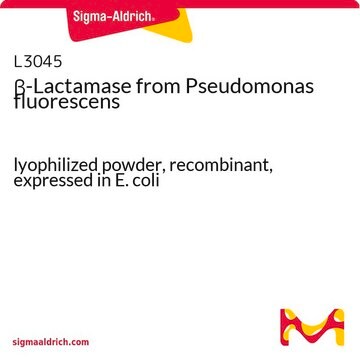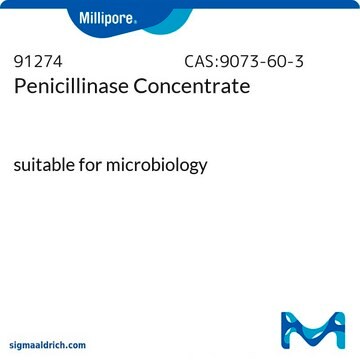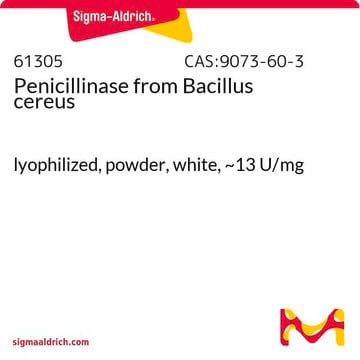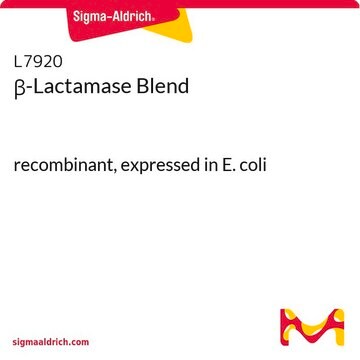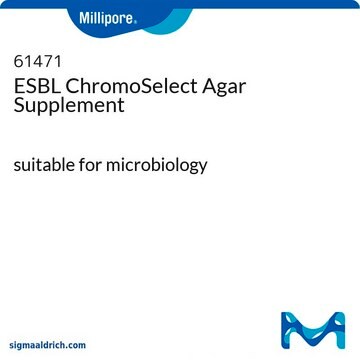L6170
β-Lactamase
recombinant, expressed in E. coli
Synonim(y):
Carbapenemase, Cephalosprinase
Zaloguj sięWyświetlanie cen organizacyjnych i kontraktowych
About This Item
Polecane produkty
rekombinowane
expressed in E. coli
Poziom jakości
Postać
powder
aktywność właściwa
≥20 U/mg (with cephalosporin C)
≥400 U/mg (with benzylpenicilin)
temp. przechowywania
2-8°C
Opis ogólny
β-Lactamase produced by bacteria is closely related to the penicillin binding proteins. β-Lactamase hydrolyzes β-lactum antibiotics and is the prime cause of resistance development by bacteria. There are four subclasses of β-Lactamases. Classes A, C and D form an acyl-enzyme via active site serine residue. Class B β-lactamases are metalloenzymes with zinc ion at their active site for β-lactam hydrolysis. Mutations in the β-lactamases has resulted in the generation of extended-spectrum β-lactamases (ESBLs). As close to 900 types of β-Lactamases are produced by microbes.
Zastosowanie
β--lactamase is used to inactivate β-lactam antibiotics by breaking open the β-lactam ring. β--lactamase is used to study antibiotic resistance and resistance suppression. Product L6170 is recombinantly produced based on the sequence of the enzyme from Pseudomonas aeruginosa, and is expressed in E. coli.
β-Lactamase has been used in coumarin-cephalosporin-fluorescein-acetoxymethyl (CCF4)- β-Lactamase assay in dendritic cells and in the hydrolysis of meropenem (H-Mer) to generate 18O-labeled H-Mer.
Działania biochem./fizjol.
β--lactamase inactivates β-lactam antibiotics by breaking open the β-lactam ring. Typical analysis for other substrates: ceftriaxon 2-4 un/mg; cefazolin 2-4 un/mg; ceftazidime 1.5-3 un/mg; cefoxitin 0.35-0.7 un/mg; cefepime 1.2-2.4 un/mg; cefuroxime 1.5-3 un/mg; cefotaxime 1-2 un/mg, oxacillin 4-8 un/mg; imipenem 1.2-2.4 un/mg; and meropenem 3-6 un/mg
Typical analysis for other substrates: ceftriaxon 2-4 un/mg; cefazolin 2-4 un/mg; ceftazidime 1.5-3 un/mg; cefoxitin 0.35-0.7 un/mg; cefepime 1.2-2.4 un/mg; cefuroxime 1.5-3 un/mg; cefotaxime 1-2 un/mg, oxacillin 4-8 un/mg; imipenem 1.2-2.4 un/mg; and meropenem 3-6 un/mg
Definicja jednostki
One unit will hydrolyze 1.0 μmole substrate per min (βI: benzylpenicillin; βII: cephalosporin C) in 50 mM phosphate buffer, pH 7.0 containing 10 μM zinc chloride at 25 ºC.
Postać fizyczna
Lyophilized powder containing sodium chloride and potassium phosphate.
Kod klasy składowania
11 - Combustible Solids
Klasa zagrożenia wodnego (WGK)
WGK 3
Temperatura zapłonu (°F)
Not applicable
Temperatura zapłonu (°C)
Not applicable
Certyfikaty analizy (CoA)
Poszukaj Certyfikaty analizy (CoA), wpisując numer partii/serii produktów. Numery serii i partii można znaleźć na etykiecie produktu po słowach „seria” lub „partia”.
Masz już ten produkt?
Dokumenty związane z niedawno zakupionymi produktami zostały zamieszczone w Bibliotece dokumentów.
Klienci oglądali również te produkty
Updated functional classification of beta-lactamases
Bush K and Jacoby GA
Antimicrobial Agents and Chemotherapy, 54(3), 969-976 (2010)
Determining carbapenemase activity with 18O labeling and targeted mass spectrometry
Wang M, et al.
Analytical Chemistry, 85(22), 11014-11019 (2013)
VAMP8-mediated NOX2 recruitment to endosomes is necessary for antigen release
Dingjan I, et al.
European Journal of Cell Biology, 96(7), 705-714 (2017)
Antibiotic resistance and extended spectrum beta-lactamases: Types, epidemiology and treatment
Shaikh S, et al.
Saudi Journal of Biological Sciences, 22(1), 90-101 (2015)
Ardeshir Rineh et al.
ACS infectious diseases, 6(6), 1460-1479 (2020-04-25)
The formation of biofilms provides a formidable defense for many bacteria against antibiotics and host immune responses. As a consequence, biofilms are thought to be the root cause of most chronic infections, including those occurring on medical indwelling devices, endocarditis
Nasz zespół naukowców ma doświadczenie we wszystkich obszarach badań, w tym w naukach przyrodniczych, materiałoznawstwie, syntezie chemicznej, chromatografii, analityce i wielu innych dziedzinach.
Skontaktuj się z zespołem ds. pomocy technicznej


